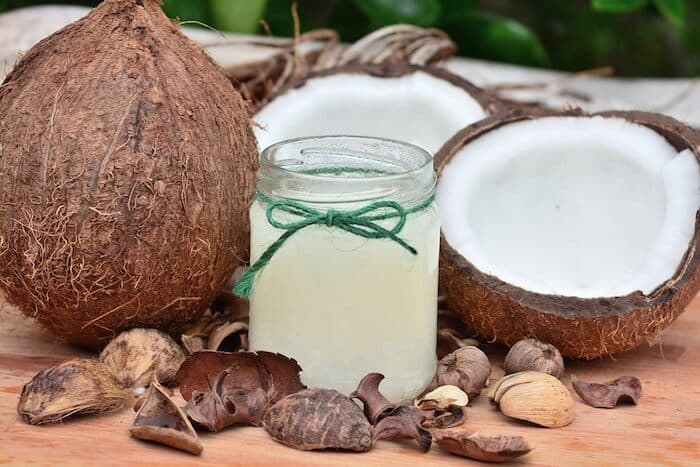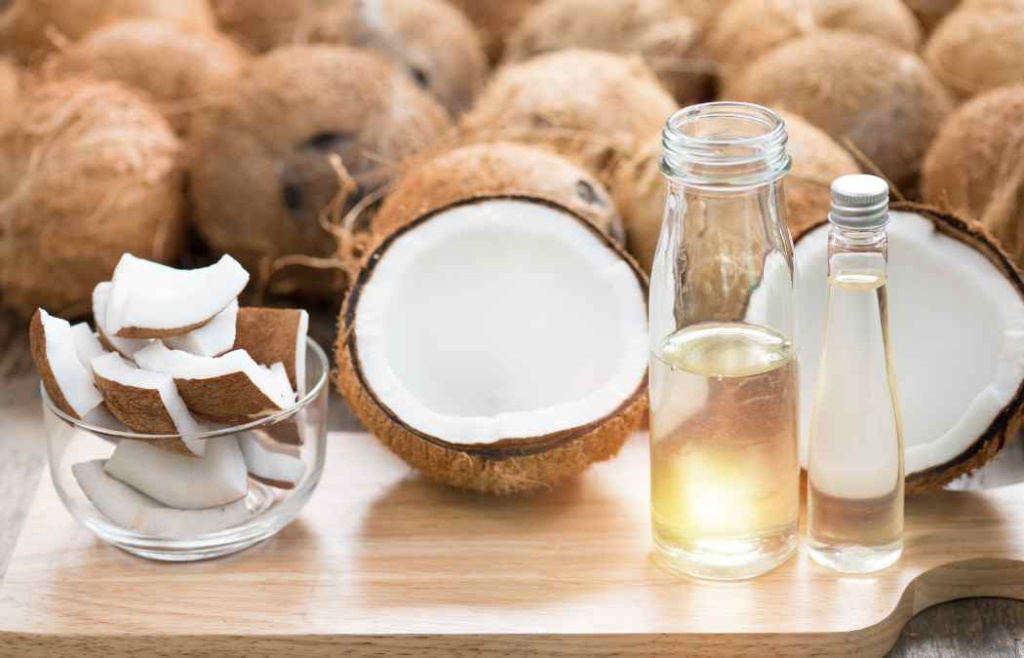How to Diminish Wrinkles Using Coconut Oil
Coconut oil has been a popular natural ingredient in skincare and beauty routines for centuries. Its moisturizing properties and potential benefits in reducing fine lines and wrinkles make it a go-to choice for many. In this article, we’ll explore how coconut oil can help diminish signs of aging and provide you with easy and practical ideas to incorporate it into your skincare routine.

Let’s dive into the wonderful world of coconut oil and discover its secrets to achieving smoother, more youthful-looking skin!
How Coconut Oil Diminishes Fine Lines and Wrinkles
Coconut oil offers a range of potential benefits that can help diminish fine lines and wrinkles, contributing to a more youthful complexion. As a skincare dermocosmetic technician with expertise in natural and organic skincare formulation, let’s explore the reasons behind coconut oil’s effectiveness:
1. Moisturizing Properties and Hydration Benefits
Coconut oil is rich in fatty acids, including lauric acid, capric acid, and caprylic acid. These components help to nourish and hydrate the skin, improving its overall moisture balance. By keeping the skin adequately moisturized, coconut oil can help reduce the appearance of fine lines and wrinkles caused by dryness and dehydration.
2. Antioxidant Content and Aging Signs
Coconut oil contains antioxidants, such as vitamin E, which help protect the skin from free radical damage. Free radicals are unstable molecules that can accelerate the aging process and contribute to the formation of wrinkles. The antioxidant properties of coconut oil help neutralize these harmful molecules, minimizing their impact on the skin and potentially reducing the appearance of wrinkles.
3. Potential Collagen-Boosting Effects
Collagen is a protein that provides structure and elasticity to the skin. As we age, collagen production naturally declines, leading to the formation of wrinkles. Coconut oil may help stimulate collagen production, thanks to its high vitamin C content and antioxidant activity. By promoting collagen synthesis, coconut oil can enhance skin elasticity and firmness, reducing the visibility of fine lines and wrinkles.
4. Soothing and Anti-Inflammatory Properties
Coconut oil possesses soothing and anti-inflammatory properties that can help calm the skin and reduce redness or irritation. By maintaining a calm and balanced complexion, coconut oil contributes to a healthier skin barrier, which can indirectly minimize the appearance of wrinkles caused by inflammation or skin sensitivity.

With its moisturizing, antioxidant, potential collagen-boosting, and soothing properties, coconut oil presents a multifaceted approach to addressing fine lines and wrinkles. Let’s now explore various ways to incorporate coconut oil into your skincare routine for optimal results.
AFFILIATE COMMISSION DISCLAIMER: I may earn a commission from affiliate links in this article at no extra cost to you.
Ideas on How to Apply Coconut Oil to Diminish Fine Lines & Wrinkles 🌟
Coconut oil offers versatile ways to incorporate it into your skincare routine for diminishing fine lines and wrinkles. Here are some easy and practical ideas to consider:
- Daily Facial Moisturizer 💧: After cleansing your face, apply a small amount of coconut oil as a lightweight moisturizer to hydrate the skin and reduce the appearance of wrinkles.
- Eye Cream for Fine Lines 👁️: Gently dab a tiny amount of coconut oil around the delicate eye area to moisturize, nourish, and minimize the appearance of fine lines and wrinkles.
- Lip Balm for Smoothing Lip Wrinkles 💋: Apply a thin layer of coconut oil to your lips to moisturize, soften, and reduce the visibility of lip wrinkles.
- Overnight Face Mask 🌙: Before bed, massage a generous amount of coconut oil onto your face and leave it overnight as a deep moisturizing and anti-aging treatment.
- Facial Massage Oil 💆: Combine coconut oil with a few drops of your favorite essential oil and use it as a facial massage oil to improve circulation, promote relaxation, and enhance the absorption of nutrients.
- Makeup Remover 💄: Apply coconut oil onto a cotton pad and gently wipe away makeup, including around the eyes. Its moisturizing properties help dissolve makeup while providing hydration to the skin.
- Body Moisturizer 🚿: After showering, massage coconut oil onto your body to lock in moisture, improve skin elasticity, and reduce the appearance of wrinkles on the body.
- Cuticle Oil for Hand Wrinkles 💅: Massage a small amount of coconut oil into your cuticles to keep them moisturized and help reduce the appearance of wrinkles on the hands.
- Scalp Treatment for Hairline Wrinkles 💆♂️: Warm coconut oil and massage it into your scalp, paying attention to the hairline. This nourishes the scalp, helps reduce dryness, and can minimize wrinkles in that area.
- Beard Oil for Reducing Beard-Related Wrinkles 🧔: If you have a beard, apply a few drops of coconut oil to your beard to moisturize the skin underneath, soften the hair, and minimize the appearance of wrinkles caused by beard growth.
Feel free to choose the application methods that resonate with you and incorporate them into your daily skincare routine. Next, let’s discuss the proper way to apply coconut oil for maximum effectiveness.
Composition of Coconut Oil
Coconut oil is derived from the meat or kernel of mature coconuts. It consists of a unique composition of fatty acids, vitamins, and minerals that contribute to its skincare benefits. As a skincare dermocosmetic technician with expertise in natural and organic skincare formulation, let’s explore the key components of coconut oil:
1. Fatty Acid Profile
Coconut oil predominantly contains saturated fats, including lauric acid, capric acid, and caprylic acid. These medium-chain fatty acids have moisturizing properties, helping to nourish and hydrate the skin. Lauric acid, in particular, exhibits antimicrobial properties that can benefit overall skin health.
2. Vitamins and Minerals
Coconut oil contains several vitamins and minerals that promote skin health. Vitamin E, known for its antioxidant properties, helps protect the skin from free radical damage. It also assists in maintaining skin elasticity. Additionally, coconut oil contains small amounts of vitamin K and vitamin C, which contribute to collagen synthesis and overall skin vitality.
3. Other Bioactive Compounds
Coconut oil also contains various bioactive compounds, such as polyphenols and phytosterols, that contribute to its skincare properties. These compounds have antioxidant, anti-inflammatory, and potentially collagen-boosting effects, supporting the overall health and appearance of the skin.
The unique composition of coconut oil, with its fatty acids, vitamins, and bioactive compounds, makes it a valuable ingredient for diminishing fine lines and wrinkles. Now, let’s explore different ideas for incorporating coconut oil into your skincare routine to harness its benefits effectively.
How to Apply Coconut Oil for Best Results

To ensure maximum effectiveness and optimal results, here’s a step-by-step guide on how to apply coconut oil:
- Cleanse your face: Start with a clean, freshly washed face. Gently cleanse your skin using a mild cleanser suitable for your skin type, and pat it dry with a clean towel.
- Warm the coconut oil: Coconut oil solidifies at cooler temperatures, so warm a small amount of coconut oil in your hands or using the double-boiler method until it melts into a liquid state.
- Apply a small amount: Take a small amount of the melted coconut oil onto your fingertips. Remember, a little goes a long way, so start with a pea-sized amount and adjust as needed.
- Gently massage onto the skin: Begin applying the coconut oil to your face, using upward circular motions. Massage it into your skin, focusing on areas with fine lines and wrinkles. Take your time to ensure even coverage and absorption.
- Pay attention to delicate areas: When applying coconut oil around the eye area, use gentle tapping motions with your ring finger to avoid excessive pulling or tugging on the skin.
- Allow absorption: Let the coconut oil absorb into your skin for a few minutes before applying any additional skincare products or makeup. This allows the oil to deeply moisturize and nourish your skin.
- Adjust quantity based on skin type: Coconut oil may be more suitable for dry and normal skin types. If you have oily or acne-prone skin, you may want to use it sparingly or try patch testing before incorporating it into your routine.
Remember, everyone’s skin is unique, so it’s important to observe how your skin responds to coconut oil. If you experience any adverse reactions or sensitivity, discontinue use and consult with a skincare professional.
By following these steps, you can effectively apply coconut oil to your skin and maximize its potential benefits for diminishing fine lines and wrinkles.
BUY ORGANIC FRACTIONATED COCONUT OIL
Incorporating Coconut Oil into Your Skincare Routine

To harness the benefits of coconut oil for diminishing fine lines and wrinkles, here are some tips for incorporating it into your skincare routine:
- Step-by-step integration: Gradually introduce coconut oil into your routine to assess compatibility with your skin. Start by using it a few times a week and gradually increase frequency if your skin responds well.
- Customize application: Experiment with different application methods discussed earlier, such as using it as a daily moisturizer, overnight mask, or targeted treatment for specific areas.
- Layering with other products: Consider layering coconut oil with other skincare products. Apply coconut oil as the final step in your routine to seal in moisture and enhance the absorption of other products.
- Sunscreen application: While coconut oil offers some natural sun protection, it is not a substitute for a dedicated sunscreen. Apply sunscreen with adequate SPF after applying coconut oil to protect your skin from harmful UV rays.
- Observe skin response: Pay attention to how your skin reacts to coconut oil. If you notice any signs of irritation, redness, or breakouts, discontinue use and consult with a skincare professional.
Remember, everyone’s skin is unique, and what works for one person may not work for another. As a skincare dermocosmetic technician with expertise in natural and organic skincare formulation, consider your individual needs and preferences when incorporating coconut oil into your routine.
Next, we’ll discuss the skin types that can benefit from coconut oil and those that may require caution.
Suitable and Unsuitable Skin Types for Coconut Oil
Coconut oil can be beneficial for certain skin types when used appropriately. However, it’s important to note that individual responses may vary. Here are some general guidelines on suitable and unsuitable skin types for coconut oil:

Suitable Skin Types:
- Dry and Dehydrated Skin: Coconut oil’s moisturizing properties make it an excellent choice for dry and dehydrated skin. It helps to replenish lost moisture, improve skin barrier function, and reduce the appearance of fine lines and wrinkles caused by dryness.
- Mature or Aging Skin: Aging skin often experiences a decline in moisture levels and elasticity, leading to the formation of wrinkles. Coconut oil can provide hydration, nourishment, and potential collagen-boosting effects, making it beneficial for mature or aging skin.
- Normal Skin with Occasional Fine Lines: Normal skin types that exhibit occasional fine lines and wrinkles can benefit from the moisturizing and antioxidant properties of coconut oil. It can help maintain skin health and delay the onset of visible signs of aging.
Unsuitable Skin Types:
- Acne-Prone or Oily Skin: Coconut oil has a comedogenic rating, which means it may clog pores and potentially trigger breakouts in acne-prone or oily skin types. If you have such skin, it’s advisable to proceed with caution or choose alternative lightweight, non-comedogenic oils.
- Allergies or Sensitivities to Coconut Oil: Individuals with known allergies or sensitivities to coconut oil should avoid using it. Conduct a patch test before incorporating coconut oil into your routine to ensure it doesn’t cause any adverse reactions.
As a skincare dermocosmetic technician with certifications in natural and organic skincare formulation, it’s important to consider your skin type, its specific needs, and potential sensitivities when using coconut oil. If you have any concerns or questions, it’s recommended to consult with a skincare professional for personalized advice.
Now, let’s discuss the importance of patch testing and when to expect results from using coconut oil.
The Importance of Patch Testing and When to Expect Results
When incorporating any new skincare product, including coconut oil, into your routine, it’s crucial to perform a patch test to assess your skin’s compatibility and potential reactions. Additionally, it’s important to set realistic expectations regarding the timeframe for expected results. Here’s what you need to know:
Patch Testing
Before applying coconut oil to your face or body, conduct a patch test:
- Choose a small, inconspicuous area on your inner arm or behind your ear.
- Apply a small amount of diluted coconut oil and observe for 24-48 hours.
- Look for any signs of irritation, redness, itching, or inflammation.
If you experience any adverse reactions during the patch test, such as persistent redness or discomfort, it’s best to avoid using coconut oil on your skin and seek guidance from a skincare professional.
When to Expect Results
It’s important to note that results from using coconut oil for diminishing fine lines and wrinkles may vary among individuals. Factors such as skin type, severity of wrinkles, consistency of use, and overall skincare routine can influence the timeline for noticeable improvements.
Generally, it takes time and regular application to observe visible changes. You may start noticing subtle improvements in skin hydration, smoothness, and texture within a few weeks to a couple of months. However, it’s essential to maintain realistic expectations and understand that individual results may differ.
Consistency is key when using coconut oil. Incorporating it into your daily skincare routine and being patient with the process can yield the best outcomes over time. Remember to monitor your skin’s response, adjust application techniques as needed, and consult with a skincare professional for personalized advice and guidance.
BUY ORGANIC FRACTIONATED COCONUT OIL
Mixing Coconut Oil with Other Natural Ingredients for Different Skin Types
Combining coconut oil with other natural ingredients can enhance its benefits and cater to different skin types. Here are some ideas for mixing coconut oil with other ingredients based on various skin types:
Combination Skin:
- Coconut oil and aloe vera gel: Mix equal parts of coconut oil and aloe vera gel for a lightweight moisturizer that provides hydration without feeling heavy on the skin. Aloe vera helps balance oil production while soothing and calming the skin.
Sensitive Skin:
- Coconut oil and chamomile extract: Combine coconut oil with a few drops of chamomile extract to create a soothing and calming facial oil. Chamomile has anti-inflammatory properties that can help soothe sensitive skin and reduce redness or irritation.
Mature Skin:
- Coconut oil and rosehip seed oil: Blend coconut oil with a few drops of rosehip seed oil, which is rich in vitamins and antioxidants. This combination helps hydrate the skin, improve elasticity, and reduce the appearance of wrinkles and age spots.
Dry Skin:
- Coconut oil and shea butter: Mix equal parts of coconut oil and shea butter to create a deeply nourishing and moisturizing body butter. This combination helps replenish moisture, soothe dryness, and promote soft and supple skin.
Normal Skin:
- Coconut oil and green tea extract: Infuse coconut oil with green tea extract by mixing them together. Green tea extract provides antioxidant properties that can protect the skin against free radicals and support overall skin health.
Remember to perform a patch test when combining new ingredients to ensure your skin reacts positively. Additionally, consider your individual skin sensitivities and preferences when choosing ingredients to mix with coconut oil.
Choosing Coconut Oil for Skincare and Its Use on the Body and Hair
When selecting coconut oil for skincare, it’s important to consider certain factors to ensure you’re choosing a high-quality product. Additionally, coconut oil can be used not only for skincare but also for the body and hair. Here are some tips to help you make the right choices:
Choosing Coconut Oil for Skincare:
- Opt for organic, cold-pressed, unrefined coconut oil: Look for coconut oil that is labeled as organic, cold-pressed, and unrefined. This ensures that the oil retains its natural beneficial properties without the use of chemicals or high heat processing.
- Check for certifications and quality standards: Look for certifications such as USDA Organic or Fair Trade, as they indicate a commitment to quality and sustainable sourcing practices.
- Avoid products with added chemicals or fragrances: To minimize the risk of skin irritation or unwanted ingredients, choose coconut oil that is pure and free from additives, chemicals, or artificial fragrances.
Use of Coconut Oil on the Body:
Coconut oil can be used on the body to nourish and moisturize the skin, reducing the appearance of wrinkles. After showering, apply coconut oil all over your body, paying extra attention to areas prone to dryness or wrinkles, such as elbows, knees, and décolletage.
Use of Coconut Oil on the Hair:
Coconut oil can also benefit the hair by providing moisture and improving hair health. To use coconut oil on your hair, warm a small amount in your hands and apply it to the ends or lengths of your hair. Leave it on for a few hours or overnight as a deep conditioning treatment before shampooing and conditioning as usual.
Remember, everyone’s skin and hair are unique, so it’s important to observe how your body and hair respond to coconut oil. If you experience any adverse effects, discontinue use and consult with a dermatologist or skincare professional.
BUY ORGANIC FRACTIONATED COCONUT OIL
Additional Considerations and Tips for Using Coconut Oil in Your Skincare Routine
When incorporating coconut oil into your skincare routine, there are a few additional considerations and tips to keep in mind. Here’s what you need to know:
1. Storage and Shelf Life:
- Store coconut oil in a cool, dry place away from direct sunlight to prevent degradation.
- Coconut oil typically has a long shelf life, but it’s best to check the expiration date or use it within 1-2 years for maximum potency.
2. Customization:
- Feel free to experiment and customize your coconut oil blends by adding a few drops of your favorite essential oils for additional benefits and a personalized scent.
3. Hygiene:
- To maintain hygiene and prevent contamination, consider using a clean spoon or scoop to extract coconut oil from the jar, especially if using it for multiple applications.
4. External Use Only:
- Coconut oil is for external use only and should not be ingested.
5. Consistency:
- Consistency is key when using coconut oil. Incorporate it into your skincare routine regularly to experience its potential benefits over time.
6. Consultation:
- If you have specific skin concerns, allergies, or conditions, it’s always a good idea to consult with a dermatologist or skincare professional before incorporating new products into your routine.
7. Enjoy the Process:
- Embrace the natural, soothing aroma and the luxurious feeling of coconut oil on your skin. Make it a mindful and enjoyable part of your self-care routine.
By considering these tips and taking proper care of your coconut oil, you can maximize its benefits and enhance your overall skincare experience.
My Recommended Coconut Oil: US Organic Fractionated Coconut MCT Oil (Liquid Coconut Oil)
Introducing US Organic Fractionated Coconut MCT Oil (Liquid Coconut Oil), my top recommendation for organic coconut oil. Sourced from the finest hand picked coconuts, this cold-pressed oil is rich in nutrients, antioxidants, and moisturizing properties, making it an excellent choice for diminishing fine lines and wrinkles. Does not solidify in low temperature. 100% Pure, Hexane-Free. Get here.
Last Words
Coconut oil offers a range of potential benefits for diminishing fine lines and wrinkles. From its moisturizing properties to antioxidant content, coconut oil can nourish and improve the appearance of the skin. By incorporating it into your skincare routine using the suggested ideas, and considering your specific skin type and needs, you can make the most of coconut oil’s potential.
Remember, as a skincare dermocosmetic technician with certifications in natural and organic skincare formulation, your expertise can guide you in choosing the right coconut oil and optimizing its usage for your unique skincare goals. Enjoy the journey to smoother, more youthful-looking skin with the help of coconut oil!

